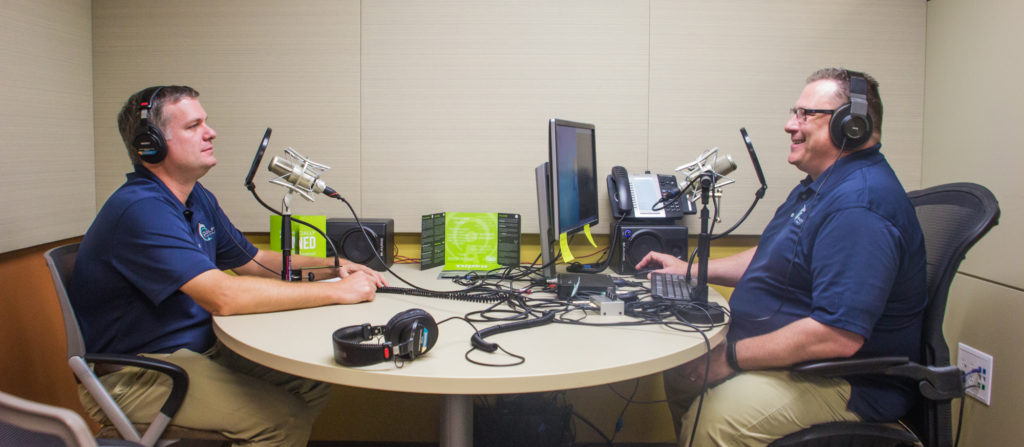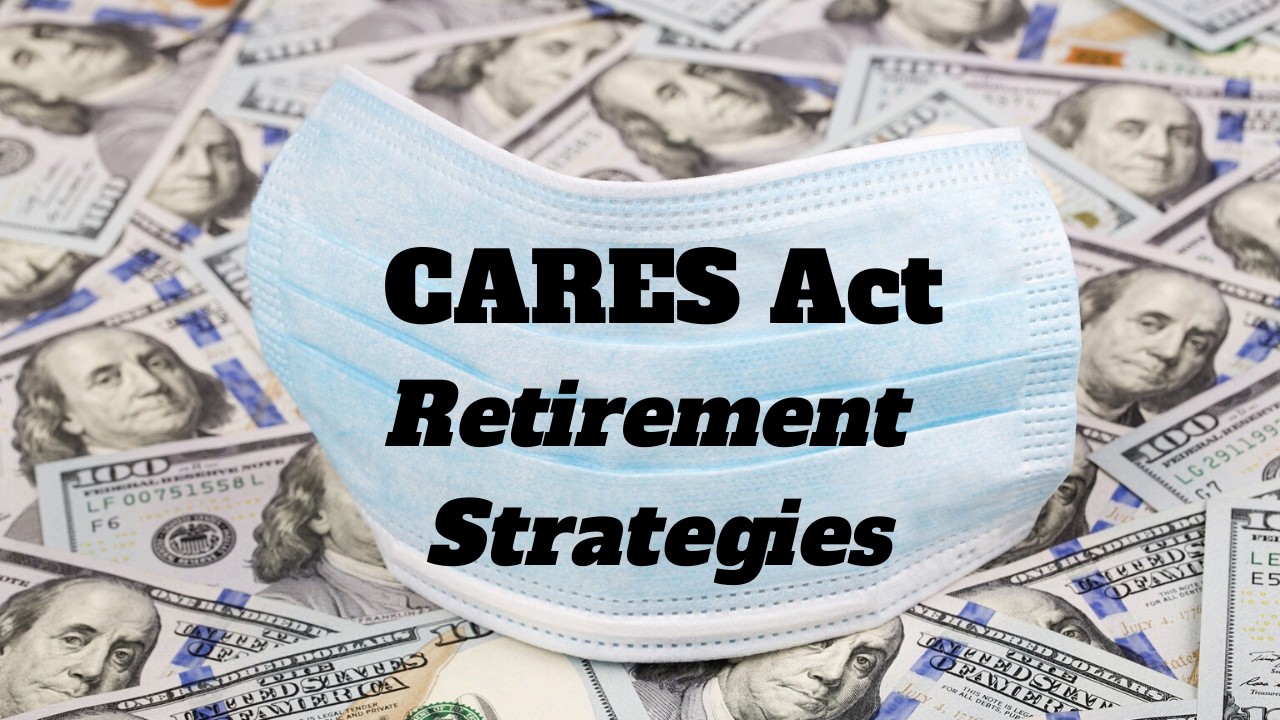Should I Do A Roth Conversion? Impact Of The SECURE Act.
Summary:
With the passage of the SECURE Act and the changes to IRA rules, discussion on Roth conversions is heating up.
In this show we will talk about why Roth conversions are a hot topic now and also why they do NOT make sense for many people.
If you are considering converting your Traditional IRA to a Roth IRA, listen in to learn more.
Watch Video Version:
Podcast Transcript
Daniel Wendol 0:00
With the passage of the SECURE Act and the changes to IRAs, there are a lot of advisors pushing the Roth conversion conversation. In today’s show, I want to talk briefly about why Roth conversions are a hot topic right now. I also want to talk about why they do NOT necessarily make sense for most people.
Hello, and welcome to another Dolphin Financial Radio show with me, Dan Wendol, owner of Dolphin Financial Group. Alongside me as Tony Shore, looking dapper, looking excited to talk about Roth conversions. I had a feeling that when I said this is the topic you were just chomping at the bit to talk about this.
Tony Shore 1:10
Well, I might not have been, I think that was more the Red Bull I just drank. The energy drink that I just had, probably, than my excitement over the topic, Dan, but it is important to understand and I hear great things about Roth IRA. Roth IRA conversions, Roth conversions! I’ve been hearing that a lot lately especially with the passing of the SECURE Act. So as usual, I think your take will be unique, possibly contrarian. So you know, conventional wisdom out there, you hear the same old thing from everyone, but to get a bird’s eye view and kind of take different angles on things…that’s what I love about this show. Obviously between my wit and your wisdom, as I think it’s a winning combination. Right?
Daniel Wendol 2:02
I agree about the wit part anyway. I don’t know about my wisdom. No, you know, you’re right. I’ve heard a lot of advisors and I hear commercials for Roth conversions. Why don’t I take a step back? For those that don’t really know what a Roth and a Roth conversion is, let me just do a quick two minute explanation. A Roth is a type of characterization of an IRA. So an IRA, individual retirement account, there’s traditional and there’s Roth. Most people have traditional, you know, 401k or 403B, eventually is converted into a own traditional IRA. You’re putting pre tax money and you’re not paying tax on it. It comes out of your salary or you put money aside. Eventually, when you go to take that money, you pay tax. So that’s a traditional IRA. A Roth, however, is you put after tax money in. So this will be money that you’ve already paid tax on sitting in your checking account, you write a check, and put it into the Roth IRA. Now, when you go to take that money out in the future, you don’t pay tax on it. And you don’t pay tax on the gains either. That’s the beauty of a Roth versus a Tradition. A Roth conversion is…let’s say you have $50,000 in your IRA, and you don’t like the idea of having to pay taxes on that in the future when you grow it ot when you turn 72, when you have to take that money out. You can actually convert that traditional IRA into a Roth. What you are fundamentally doing is taking the money out of the IRA, paying the taxes, and then putting right back into a new IRA called a Roth.
Tony Shore 4:03
But I’d have you pay the tax all the taxes on that whole amount I’m converting.
Daniel Wendol 4:08
Right, exactly.
Tony Shore 4:09
And there’s no way to get around that. Right?
Daniel Wendol 4:12
Correct. So but you have to be strategic about it. And that’s what I want to talk about today. So that’s the difference between a Roth and a traditional, and that’s what a Roth conversion is – taking a traditional IRA and making it into a Roth by paying the taxes. Why do people do that? Because they figured, well, I’ll pay taxes now so that I won’t have to pay taxes on this in the future.
Tony Shore 4:34
I see. I hear that line and maybe we’ve used on the show, but I hear different financial, so called professionals out there talking about their analogy is – would you rather pay tax on the seed or on the harvest? You’d rather pay taxes up front on the seed because obviously, it’ll be less is the assumption.
Daniel Wendol 4:56
Right and what I’m seeing now is a lot of advisors saying let’s take your entire seed bag and turn that into a Roth and pay taxes later. As opposed to what I’m going to recommend – spoiler alert – is to take a few seeds at a time and convert. So what did the SECURE Act do to make this a hot topic? The SECURE Act the passed in December of 2019. The law eliminated the ability to stretch an IRA. So for a quick explanation what that means- when you inherit an IRA, let’s say your grandfather died, Tony, and he gave you a $50,000 IRA, you have options. You could take all of it and pay the taxes. Government says thank you. Or you could stretch it over your life and say, I’m going to take money as required based on my lifespan. You are going to take a little bit over time. And you can do that for the next 50 years, and thereby spreading the tax burden over that time.
Tony Shore 6:22
And even pass it along to my children, and then they could stretch it and it can just keep going.
Daniel Wendol 6:27
Right. So that’s the way it used to be. You could stretch it over your lifetime, but now the game has changed. The SECURE Act has eliminated that stretch option. So now, those that inherited IRA have to take it within 10 years. So you can’t spread it over your lifetime. You can still take it immediately, that’s always an option, or you could spread it over 10 years instead of your lifetime. There are some exceptions. If you’re a surviving spouse, and your spouse dies, you can inherit it and make it your own. Or if you’re within 10 years og age of the person that died. So if your uncle died and he’s nine years older than you and left you an IRA, you can stretch that over your lifetime. But for most people, when inheriting an IRA that’s not from a spouse, they are now subject to a 10 year maximum stretch. Okay?
Tony Shore 7:22
Oh, so it can only be stretched 10 years, and then you have to take it or take RMDs, or take it all and pay taxes.
Daniel Wendol 7:30
Right. What’s the problem with that? The problem is taxes. This is really it’s a tax issue.
Tony Shore 7:38
Yeah. This is all about taxes, right? I mean whether Roth, traditional, stretch.
Daniel Wendol 7:45
Right. And so the idea behind a stretch is to spread the taxes over a lifetime instead of over immediate or 10 years. If you think about when people inherit an IRA, that’s not from a spouse , they inherit it from a parent usually. Typically, that parent is going to be more than 10 years older than them. They usually inherit an IRA from a parent when they are in a high tax bracket. They might be in their 50s when their parents die. And that’s pretty much the prime working years for people, their 50s, when they’re making the most, which means that they’re in the highest tax bracket possible. They inherit this lump sum, and are adding fuel to the fire on the tax bill. So if I’m making $80k, and now I inherited $100k, if I take it all at once, I’ve just made $180k this year, and I need pay taxes on that at the $180k tax bracket. People don’t want it all now. Let me stretch it and just take a little bit and pay taxes on a little bit each year. So that’s why the stretch was so powerful. People are inheriting IRAs at a really high tax bracket time. And so they want to take it when it makes more sense for them. I’ll give you another practical example: My wife worked for Pepsi and she got a pension. Pepsi offered her at some point, years ago, a buyout. And we said, No, it doesn’t make sense. But then, when we moved to Florida, there was a time where we both were in between jobs. So our income that year was very low. And that’s the point we took the buyout on that pension. We didn’t to take the money and spend it. We converted it to a Roth. We paid the tax bracket on our income that year, which was really low. So we had basically little to no tax on that conversion. It just made sense during that tax year. So the Roth conversion is a tax decision based on your tax brackets and taxed income. The fact that the SECURE Act has eliminated the idea of stretching and over your lifetime, is getting people to think more and more about well, I don’t know if I want to leave my kids an IRA. Wouldn’t it be better to pass down a Roth IRA? So that’s what’s causing all the hubbub. Now, what is so special about a Roth is that it’s tax free. Let’s say, Tony, you have a Roth of $10,000 and you happen to invest in something crazy that you know about that we’re not going to tell anyone on the podcast. Let’s say that little idea you have about the donut shop thing…Let’s say that thing explodes, and you turn that $10,000 investment into $10 million. If you have that in a Roth, well, just so happens that $10 million is going to be tax free. And remember where you came from. Remember who was there when the times were tough, Tony.
Tony Shore 11:20
Ha! Sure.
Daniel Wendol 11:25
So the thought is, why not do a Roth? I would rather have a Roth because the gains are going to be tax free in the future. And anytime I have to take the money out, I don’t have to pay taxes on it. They don’t consider it taxable, which is why Roths are so much more appealing than traditional IRAs. So the government says, Yeah, you know what, we see that too, and we’re going to make you take it over 10 years because we want our tax revenue. By the way, a Roth has to be taken over 10 years now too. You can’t stretch a Roth.
Tony Shore 12:02
Oh, really? I thought it was just a traditional that has to be taken within 10 years.
Daniel Wendol 12:06
No, the traditional you have to take within at least 10 years and pay taxes. Roth, you have to take within least 10 years, but you don’t pay tax. This is really relevant to people with a lot of money, which is why the advisors are touting it because people with a lot of money, they want them as clients. Let’s say someone’s dying, and they have a million dollars, and they going to leave it to their four children. I have three brothers. So if if my dad had a million and died, we each get $250,000. That’s a lot of money, but it’s a lot different if I was an only child and I inherited a million dollars. Think about what tax bracket would be then, as opposed to $250k. So now you can see how only children, or if you’re going to leave it to one person, the stretch IRA really can impact them. Instead of spreading it over their life, they have to spread it over 10 years, it can make a big difference to the government and tax revenue. Hence why the government did it.
Tony Shore 13:22
Right. So how is your take contrarian to the status quo out there, or what we’ve been hearing from financial experts?
Daniel Wendol 13:36
The financial experts are now pushing toconvert your traditional IRA to a Roth now. You have 100,000 in your IRA? Let’s just do it. Let’s do it while you’re young. Tax rates are going up. Let’s just pay the tax now and be done with it. And it’s so much better to have a Roth than a traditional IRA. Now I agree. There is a huge benefit to having a Roth versus traditional, but to do it all right away doesn’t make sense to me. Yeah, it’s better to do it when you’re younger and you can make up the tax break over time and you can have growth, but I see a lot of people pushing let’s just get it done. Let’s just do it. Do it. Do it. You have to do it in small increments. You remember the movie Shawshank Redemption Tony?
Tony Shore 14:25
Oh, of course. Written by Stephen King.
Daniel Wendol 14:29
Do you remember how he got out of the prison?
Tony Shore 14:33
Yes. He dug a hole in the wall.
Daniel Wendol 14:38
Do you remember how he didn’t get caught with all the rocks and rubble?
Tony Shore 14:46
Oh, no, I’ve seen it many times. It’s just been a long time. What did he do with the rubble? He put it in his pockets and then emptied his pockets out in the yard as he was walking around!
Daniel Wendol 14:58
Did he did he just make a big pile and carry it out in the yard?
Tony Shore 15:01
No, he did it did a little bit at a time. So it wasn’t noticable.
Daniel Wendol 15:05
A little bit at a time. So I’m going to call this the “Shawshank Roth Conversion.”
Tony Shore 15:10
I love it the “Shashank Roth Conversion!!”
Daniel Wendol 15:12
So let’s imagine that you make $60,000 and the next tax bracket is at $80k. You have $100,000 of conversion that you want to do, and the advisor saying, etl’s convert $100,000 now. Yes, you’ll pay the taxes, but you’ll make it up in the end. My thought is, if you’re making $60k, and you don’t bump up to the next tax bracket until you at $80k, why not just convert $20k or $15k this year, so that you’re paying the lower tax bracket? And then next year, you could do the same thing. Maybe you only can do $10k next year because you got a raise. Maybe you didn’t make as much and you can convert more that year. So the idea of doing a massive conversion, lump sum conversion, now doesn’t make sense to me. Yuch more strategic about it. You have to take the Shawshank method because in this case, you’re not going to get caught by prison guards, you’re going to get hit by the IRS.
And the IRS is worse than prison guards.
Right! And you’re going to bump yourself up to the next tax bracket. Here’s the other reason why I’m a little different than the other advisors – Most of my clients are in their late 50s or 60s, so they don’t have as much time to make up the Roth conversion taxes. The whole point of it is for the Roth to grow, generate a higher return, and then get tax free money later. Most of the clients that are in their 60s, 70s, 80s would do a Roth conversion because they want to pay taxes instead of having their kids pay taxes. It’s more about legacy. So doing it all at once doesn’t make sense for them either because they are on Social Security, which isn’t taxed up to a certain point. You can have Social Security and not pay tax on it. Once you start making above certain amounts of income, depending on if you’re married or not, your Social Security then becomes taxable. By doing a Roth conversion, and paying the taxes, you might actually now have your Social Security taxed. So you can’t just go willy nilly here. You have to be much more strategic about it. Don’t be tricked into thinking, Oh, the rules change I gotta get out of the traditional into the Roth. Let’s just get it done and not think about it. Why not do it over time? Why not do a “Shawshank Roth conversion”?
Tony Shore 17:40
“Shawshank Roth.” I love it. I love it. You’ve come up with a new financial term.
Daniel Wendol 17:48
Well, it’s I I have to say that one of my friends came up with the idea of Shawshank but it was more about going out to Las Vegas and not spending all your cash and letting your spouse know about it. So it’s like Shawshank a few bucks from the house or from the kids piggy bank over the next six months and build up a stash of cash.
Tony Shore 18:15
That’s awesome. I mean, that’s bad, but yeah, well with friends like that, Dan….
Daniel Wendol 18:21
Yeah, right. Speaking of keeping things from your spouse, how is your New Year’s resolution going? Remember we talked about that? We did a show on it. And one of the main resolutations was to have a weekly conversation about money with your spouse.
Tony Shore 18:33
Yep, we’re on track. We’re doing it. I started to panic because I thought you were gonna ask me about diet and exercise as well, but the the weekly finance conversations are actually happening now and every week and we’re sticking with it. So hey, if I can do that I might be able to diet and exercise as well.
Daniel Wendol 19:00
Excellent! The next conversation I want you to have with your wife is about a Roth conversion before you file your taxes in April. Start talking about how much leeway between your next tax bracket. Do you want to convert some of your IRA money into a Roth now and just pay the taxes on it? Quite frankly, tax rates are low, relatively speaking,
Tony Shore 19:32
Kind of a sale on taxes right now.
Daniel Wendol 19:36
Right! So maybe you do a couple of grand conversion. You don’t have to do all of it. A conversion is not all or nothing. You could do $2,000. Maybe you pay $200 tax on that, Now you have the $2,000 that you can turn into $2 million and be happy because you don’t pay tax.
Tony Shore 20:00
Boom, I like it. That’s awesome. Well, this has been a great discussion. I think it’s important that people understand these distinctions. And some of the strategies and options that are available, other than, you know, the status quo of, oh, convert everything to a Roth now and bite the bullet and pay all the taxes. But yeah, maybe incrementally is better. The Shashank method! All right, well, then it’s time to wrap things up. Is there anything else you want to add? Before we go?
Daniel Wendol 20:30
We’re going to patent that, Shawshank! If you have an inherited IRA, someone died already and passed it on to you and you’re taking RMDs over your lifetime, you still must do that. This is not going to be something that you must change. Now you have to start taking it within the next 10 years. It’s just going forward. You have to be thoughtful about it. Are you thinking about a Roth conversion or heard an advertisement? I run the math. I do the math. Tony, you say it all the time. You got to do the math. I’ll do the math, we’ll talk about it. We’ll go through the different scenarios and say, Hey, this makes sense or this doesn’t make sense. And then we’ll probably have to involve your tax preparer or CPA. But that’s okay. This is all part of the process. Don’t rush into this because usually it doesn’t make sense for most people. It usually only makes sense for a select few. And then those others it’s usually something you do over time.
Tony Shore 21:26
Yeah, the Shawshank method!
Thanks for listening to Dolphin Financial Radio based in the Clearwater, Tampa area.





